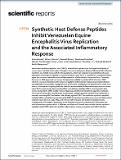Notice
This is not the latest version of this item. The latest version can be found at:https://dspace.mit.edu/handle/1721.1/133660.2
Synthetic Host Defense Peptides Inhibit Venezuelan Equine Encephalitis Virus Replication and the Associated Inflammatory Response
| dc.contributor.author | Ahmed, Aslaa | |
| dc.contributor.author | Bakovic, Allison | |
| dc.contributor.author | Risner, Kenneth | |
| dc.contributor.author | Kortchak, Stephanie | |
| dc.contributor.author | Der Torossian Torres, Marcelo | |
| dc.contributor.author | de la Fuente-Nunez, Cesar | |
| dc.contributor.author | Lu, Timothy | |
| dc.contributor.author | Bhalla, Nishank | |
| dc.contributor.author | Narayanan, Aarthi | |
| dc.date.accessioned | 2021-10-27T19:54:02Z | |
| dc.date.available | 2021-10-27T19:54:02Z | |
| dc.date.issued | 2020 | |
| dc.identifier.uri | https://hdl.handle.net/1721.1/133660 | |
| dc.description.abstract | Venezuelan equine encephalitis virus (VEEV), a New World alphavirus of the Togaviridae family of viruses causes periodic outbreaks of disease in humans and equines. Disease following VEEV infection manifests as a febrile illness with flu-like symptoms, which can progress to encephalitis and cause permanent neurological sequelae in a small number of cases. VEEV is classified as a category B select agent due to ease of aerosolization and high retention of infectivity in the aerosol form. Currently, there are no FDA-approved vaccines or therapeutics available to combat VEEV infection. VEEV infection in vivo is characterized by extensive systemic inflammation that can exacerbate infection by potentially increasing the susceptibility of off-site cells to infection and dissemination of the virus. Hence, a therapeutic targeting both the infection and associated inflammation represents an unmet need. We have previously demonstrated that host defense peptides (HDPs), short peptides that are key components of the innate immune response, exhibit antiviral activity against a multitude of viruses including VEEV. In this study, we designed synthetic peptides derived from indolicidin, a naturally occurring HDP, and tested their efficacy against VEEV. Two candidate synthetic peptides inhibited VEEV replication by approximately 1000-fold and decreased the expression of inflammatory mediators such as IL1α, IL1β, IFNγ, and TNFα at both the gene and protein expression levels. Furthermore, an increase in expression levels of genes involved in chemotaxis of leukocytes and anti-inflammatory genes such as IL1RN was also observed. Overall, we conclude that our synthetic peptides inhibit VEEV replication and the inflammatory burden associated with VEEV infection. | |
| dc.language.iso | en | |
| dc.publisher | Springer Science and Business Media LLC | |
| dc.relation.isversionof | 10.1038/s41598-020-77990-3 | |
| dc.rights | Creative Commons Attribution 4.0 International license | |
| dc.rights.uri | https://creativecommons.org/licenses/by/4.0/ | |
| dc.source | Scientific Reports | |
| dc.title | Synthetic Host Defense Peptides Inhibit Venezuelan Equine Encephalitis Virus Replication and the Associated Inflammatory Response | |
| dc.type | Article | |
| dc.relation.journal | Scientific Reports | |
| dc.eprint.version | Final published version | |
| dc.type.uri | http://purl.org/eprint/type/JournalArticle | |
| eprint.status | http://purl.org/eprint/status/PeerReviewed | |
| dc.date.updated | 2021-01-28T19:45:39Z | |
| dspace.orderedauthors | Ahmed, A; Bakovic, A; Risner, K; Kortchak, S; Der Torossian Torres, M; de la Fuente-Nunez, C; Lu, T; Bhalla, N; Narayanan, A | |
| dspace.date.submission | 2021-01-28T19:45:46Z | |
| mit.journal.volume | 10 | |
| mit.journal.issue | 1 | |
| mit.license | PUBLISHER_CC | |
| mit.metadata.status | Authority Work and Publication Information Needed |
